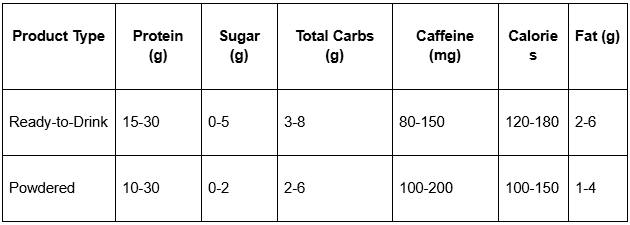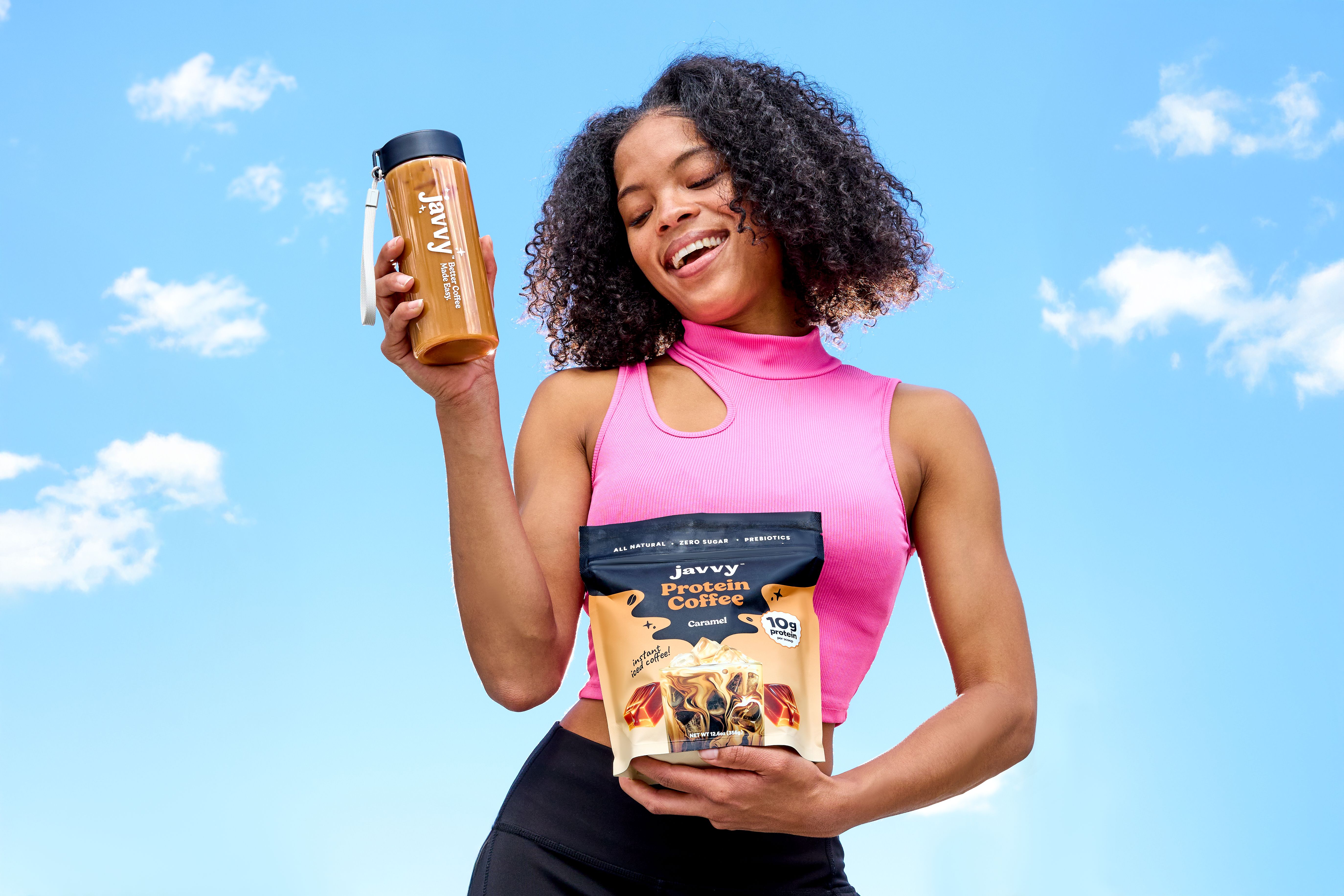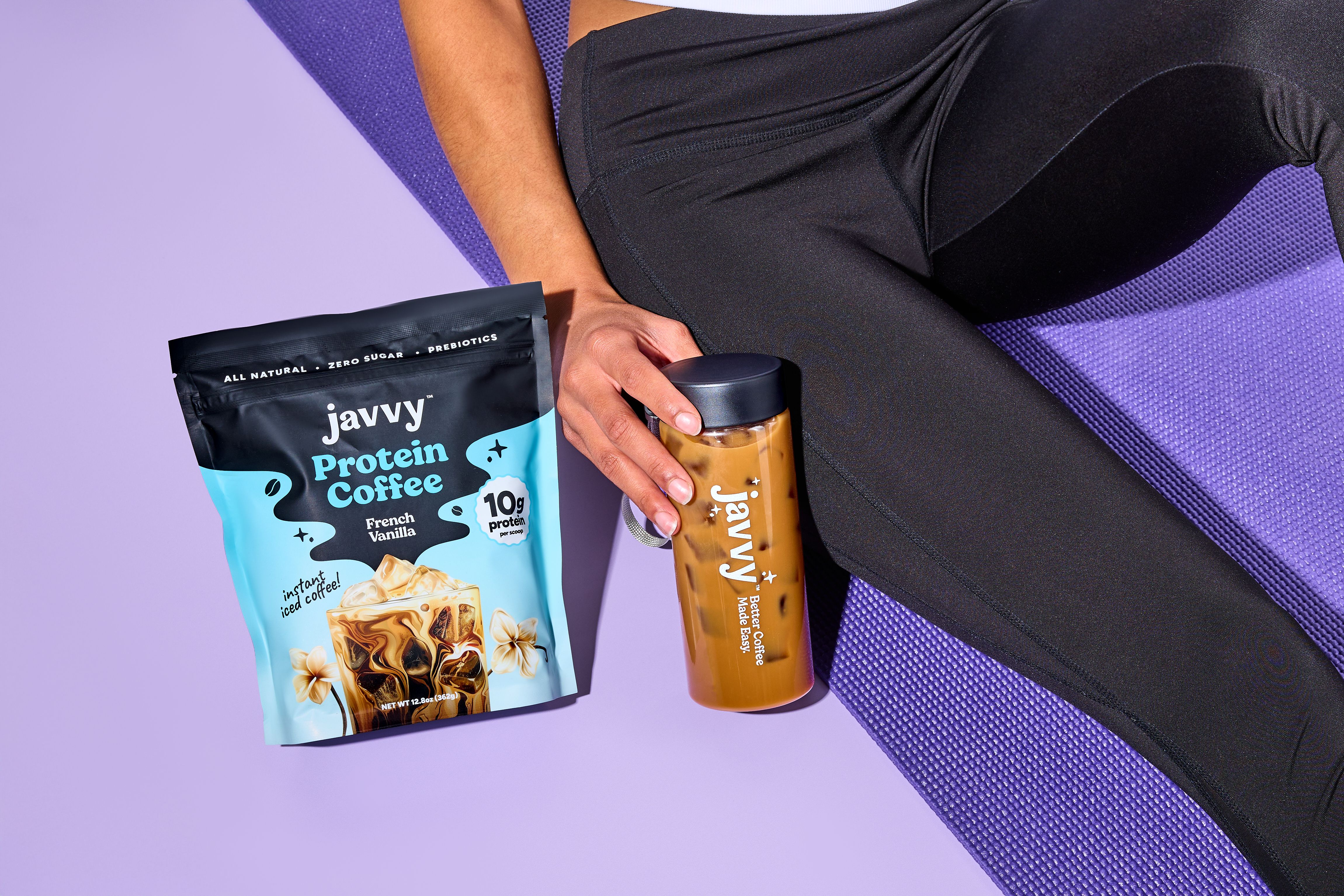
Ready‑To‑Drink vs. Powdered Protein Coffee: No Sugar, Best Macros
Ready‑to‑Drink vs. Powdered Protein Coffee: Macro Comparison
It’s worth noting that the exact macros of ready-to-drink vs. powdered protein coffee will depend on the specific product, but some generalizations can be made based on common industry choices.

Protein Per Serving
Most products provide 15-30 g protein, and 20-25 g is generally optimal for muscle protein synthesis and effective for satiety without diminishing returns.
Sugar and Total Carbs
Top products use no added sugars, relying on milk or oat bases for 3-8 g carbs from lactose or complex plant carbs, fitting many low-carb approaches.
Caffeine Content
Caffeine typically ranges from 80 to 200 mg — below 100 mg for sensitivity, 150-200 mg for pre‑workout stimulation, and comparable to or higher than an 8‑oz brewed coffee (~95 mg).
Calories and Fat
Quality options often contain <150 calories. Dairy versions tend to have 4-6 g fat, while plant‑based versions usually have 1-3 g fat with similar protein.
Javvy Coffee: Protein Coffee Without the Compromise

Want protein coffee without compromising on your health goals? Javvy Protein Coffee gives you the good stuff in one scoop: 10g premium whey protein, 0g sugar, prebiotics, and MCTs, so you get smooth coffee flavor with real benefits.
Each serving also delivers about 80 mg of caffeine, a comfortable boost for morning focus or a mid-day pick-me-up without the sugar crash.
The protein helps curb hunger and support recovery, while MCTs offer a fast-absorbing fuel source for mind and body. Prebiotics round it out by supporting a happier gut, so your coffee routine actually works harder for you.
Because it starts with 100% real Arabica coffee and naturally derived flavors, you get café taste without fillers or artificial extras.
Mixing is simple, too! Simply stir one to two scoops of our powder into cold water or milk for a protein-rich iced coffee, blend with your favorite creamer, or add it to smoothies. It’s an easy swap for pricey drinks, and a smarter upgrade from plain coffee when you want flavor, function, and convenience all in one cup.
Who Should Drink Protein Coffee?

Protein coffee fits busy pros, gym-goers, weight-loss trackers, and anyone health-minded who wants caffeine with some convenient, added protein. It helps you hit daily protein goals, works pre- or post-workout, takes the edge off hunger, and comes in clean-label formulas to fit a range of diets.
Weight Loss and Appetite Control
Most servings deliver 10-30 g protein, increasing satiety and reducing overall calorie intake; protein’s higher thermic effect and effects on ghrelin and leptin help suppress hunger, while sustained energy limits blood sugar crashes that trigger cravings.
At Javvy, our protein coffee features 10 grams of protein to keep you satisfied.
Lean Muscle Support and Recovery
Caffeine (80-200 mg) paired with 20+ g high‑quality protein can support muscle protein synthesis and recovery by fueling nutrient delivery and focus.
Generally, consuming your protein coffee ~30 minutes before or immediately after exercise can help you maximize effects.
Busy Mornings and On-the-Go Convenience
Ready‑to‑drink bottles eliminate prep time, meaning they might be ideal for commuters who need caffeine and protein in one grab‑and‑go serving. That said, ready-to-drink options also tend to expire faster, and may be pricier to stock up on.
Benefits of Caffeine and Protein Together

Caffeine and protein can work together to deliver sustained energy, increased satiety, and metabolic benefits.
Sustained Energy and Mental Focus
Here’s the lowdown: Caffeine wakes you up, while protein helps keep you steady.
Caffeine blocks adenosine in your brain (that “sleepy” signal), so focus and alertness go up.
Pair your caffeine with a solid hit of protein, and you get steadier energy because protein boosts fullness and can smooth post-meal blood sugar swings. This is particularly beneficial if you’re trying to avoid a crash after drinking plain, empty-stomach coffee.
For dosing, most performance research lands on about 3-6 mg of caffeine per kg of body weight as an effective range (roughly ~200-400 mg for many adults).
Caffeine enters your bloodstream quickly and peaks around 30-60 minutes (sometimes up to 120 minutes), so plan your protein coffee about an hour before you need it, or enjoy it soon after training if you want alertness plus recovery support from the protein.
Satiety and Calorie Control
Protein takes more energy to digest, so it helps you feel fuller and burns a few extra calories along the way.
Compared with carbs or fat, protein has the highest “thermic effect” (the energy your body spends to process food). Reviews put protein’s thermic effect at around 20-30% of its calories, while carbs are ~5-10% and fat is ~0-3%.
What does that look like in real life? 20 g of protein is about 80 calories. With a 20-30% thermic effect, your body uses about 16-24 calories just to digest and metabolize it.
That higher processing cost is one reason protein-rich options tend to keep you satisfied longer — a consistent finding across reviews and trials that link higher-protein eating with better appetite control and weight-management outcomes.
Metabolic Boost and Thermic Effect
Regular protein coffee can help raise your resting metabolic rate thanks to combined thermic effects, and an increased protein intake is linked to lower overall calorie intake and stronger appetite control.
Antioxidant and Anti-Inflammatory Support
Coffee naturally delivers chlorogenic acids (CGA), which are plant polyphenols that have antioxidant activity. This means they may be able to help protect your cells and keep them healthy.
The Bottom Line
Protein coffee makes your daily cup work harder. You get the focus boost you want from caffeine and the muscle-friendly support of real protein in one easy mix.
It’s smoother than a sugary latte, simpler than juggling shakes and shots, and flexible enough for mornings, workouts, or a mid-day reset. Stir it into water or milk, blend it into smoothies, or pour it over ice for a café-level treat that actually fits your goals.
If you’re ready for coffee that does more, we’ve got you. Let’s upgrade your routine. Shop Javvy Protein Coffee and find your new favorite flavor today!
FAQs
How much protein should I add for weight loss vs muscle building?
For weight loss, 15-20 g per serving supports satiety and metabolic health; for muscle building, aim for 20-30 g per serving, especially around workouts.
Can I mix protein powder into hot coffee without a blender?
Yes. Use heat‑stable, instantized proteins (i.e., hydrolyzed whey), mix with cool coffee first, then you can mildly heat up the coffee to help avoid clumps if you would like to enjoy it as a warm beverage.
What natural flavor options give vanilla or mocha taste without added sugar?
Vanilla bean extract and unsweetened natural cocoa powder provide authentic vanilla and mocha flavor without added sugars or artificial ingredients.
Is it safe to have protein coffee every day with caffeine?
Daily consumption of protein coffee is generally safe for healthy adults if total caffeine stays under ~400 mg and protein intake remains below ~2 g/kg body weight; it can support energy, satiety, and muscle maintenance.
How do I store shelf‑stable ready‑to‑drink protein coffee for freshness?
Store unopened bottles in a cool, dry place away from sunlight; refrigerate after opening and consume within five to seven days, avoiding extreme temperatures.
Sources:
Protein Coffee: Benefits and How To Make | Cleveland Clinic
International society of sports nutrition position stand: caffeine and exercise performance | JSSN
Molecular targets of caffeine in the central nervous system | ScienceDirect
Protein, weight management, and satiety1 | The American Journal of Clinical Nutrition
Diet induced thermogenesis | Nutrition & Metabolism | Full Text | BiomedCentral
The role of protein in weight loss and maintenance | IRP








